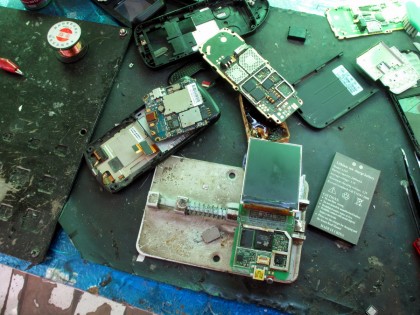An Unlikely Pope Francis Moment
Devra Torres | Jan 11, 2018 | 3 cmts

The other day, my husband, Max, stopped in at the T-Mobile store. It's a long, sad story of malfunctioning gadgets, transfers of service, and tech-illiterate Torreses. But listen to this.
My husband wished the T-mobile guy a merry Christmas and mentioned that he had a bunch of kids waiting in the car. It came out that the guy had a toddler. Max, as he is wont to do, started singing the praises of large families and encouraged the guy to have another kid or two. Then the floodgates opened.
He couldn't imagine having another kid. His wife couldn't stand him as it was. She was perfect and he always did everything wrong. (He said this not bitterly or sarcastically, but sadly.)
At this point, my husband was overwhelmed with the sense that here was someone who needed God. You need Jesus Christ, he wanted to say, and i know where He is. I know where He lives. He broached the subject.
No, the guy wasn't a Catholic, and he had no interest in becoming one. His Salvadorian mother had tried to get him baptized, but the priest found out his father was Jewish and said no. The Church didn't want him--fine, then, he didn't want the Church.
At this point, my husband had what he calls a Pope Francis moment. Now, Max is as dubious as anybody about, say, Chapter 8 of Amoris laetitia, or the papal habit of shooting the breeze with this reporter and that (though he retains a lively respect for the Holy Father and doesn't presume to judge his heart). But he found himself saying words to this effect:
Listen, forget all that! We have a new Pope, and he's always talking about mercy. Just come! We'll find some way to straighten it out! The Church doesn't want rules getting in the way of people getting to Jesus Christ!
They talked for a long time, the conversation punctuated by various kids coming in from the car to see whether Daddy was done yet, and if not, why not. Max introduced them to the guy, and they managed to charm him.
What struck my husband was an idea he remembered from Evangelii Gaudium: that we're not arbiters of grace--not in charge of deciding whether to dispense it, or who deserves how much. It was a question of prudence: whatever this guy had done, or whatever somebody had done to him in the Church's name, it wasn't the time to evaluate all that right now. He just had to get in the door. He just needed Jesus Christ.
Two notes: one friend, on hearing this story, feels fairly sure that the priest just didn't want to baptize a baby against its father's will--to do anything that might raise the specter of the forced conversions of old. Or maybe he was just reluctant to baptize without reasonable assurance that the baby would be raised Catholic. There's no way to know, of course, but it certainly might be.
The other thing is, my husband found himself encouraging the guy to walk up to our local parish, knock on the priest's door, and tell him the whole story, the better to start enjoying God's mercy as soon as possible. Thinking it over later, it became clear that in the age of the laity maybe the thing to do is not so much to direct a lost sheep to a cleric and leave it at that, but to accompany him on the road.
"Accompaniment" has been reduced to a buzzword for a lot of people--as if it's a mushy-minded alternative to speaking the truth. As if what matters is not your destination but having an unjudgmental buddy by your side on your journey to Wherever. But real accompaniment is precisely, and obviously, what's needed sometimes. Not just information, not just disembodied truth, but a companion on the road. We laypeople are co-responsible for the Church--we're not just supposed to function as the long arm of the clergy.

For another thing, it's highly likely that even if the guy followed through and turned up on the priest's doorstep, he'd run into a parish secretary who saw her mission as protecting Father from his flock, not to mention somebody else's lost sheep. The guy might never have gotten past her.
Fixing the problem of laypeople with an overly narrow perception of our role and reversing the predicament of priests mired down in bureaucracy are tall orders. I doubt they're going to be settled in the T-Mobile guy's lifetime. I have no neat and tidy ending to relate.
But given our family's incompetence with electronics, I'm sure we can find some excuse to go see him again.
---
Details have been changed to protect the privacy of the guy.

Comments (3)
Rhett Segall
Jan 13, 2018 9:26am
Thank you for sharing Max's experience with the tech clerk, Devra. I think your insight connecting Max's experience with accompaniment, lay apostolate, and the workings of grace, makes sense. I'm sure Max for his part just saw a cry for the good news that he yearned to share. I am reminded of Jesus meeting with the Samaritan woman. The Savior of the world at that point of Providence saw nothing more important than this Samaritan woman. I am also thinking that Max bears witness to God's self giving through his self giving. Further, this gift of one person to another person is incomparably great in God's eyes.
Max's experience with the clerk reminds us that one of the dangers of the social justice environment is over emphasis on organizing. Maritain stresses that a Dostoevsky, a Bloy or a Bernanos could not be organized in work teams! "...these unorganized, and unrecognizable, laymen did more for the Christian faith, in souls and in culture, than many pious associations and battalions of shock Christianity." (Notebooks)
Maritain is talking about people with unique gifts. But then each person is a unique, irreplaceable gift, called by God in the most unusual ways, even in electronic stores.
Katie van Schaijik
Jan 13, 2018 10:18am
What a great story!
And I love this line: "We're not just supposed to function as the long arm of the clergy." Amen.
Katie van Schaijik
Jan 13, 2018 10:33am
I love this basic insight, too: Forget for a minute why the person feels rejected by the Church. It's more important to make sure he feels welcome than to correct the misunderstanding of the teaching.
I recently met someone whose mother stopped going to Church when her husband left her, because (she thought) the Church doesn't allow divorced people to receive Communion. It made me so sad!